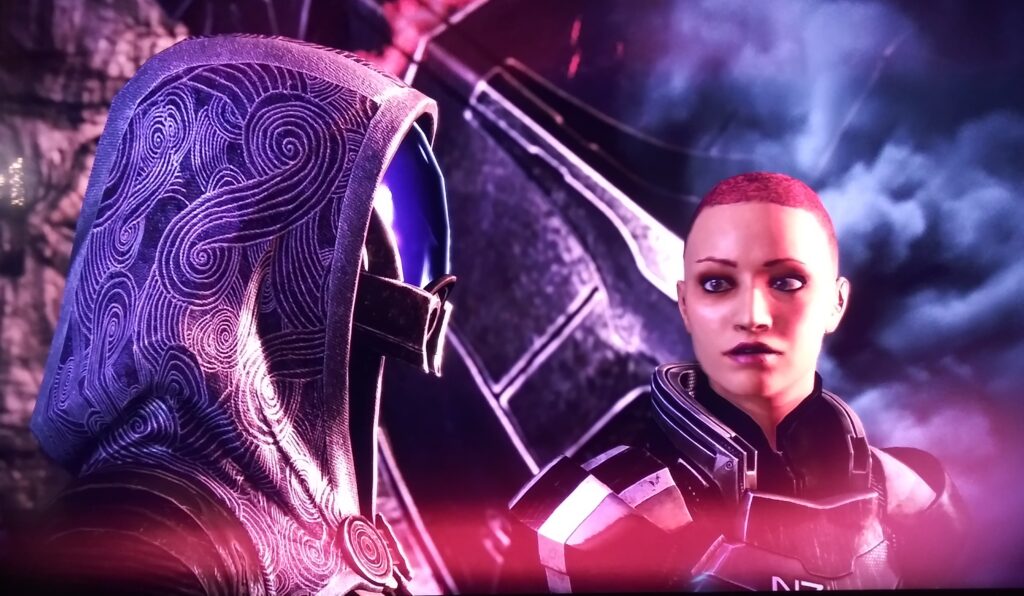
This is one of the more fascinating themes of the story. Quarians invent Geth as a servant robot race, but they’re AI and they evolve into consciousness. When the Quarians realize this, they decide to wipe out the Geth. The Geth resist and fight back. Eventually the Quarians are driven from their homeworld and have since lived for centuries on the Migrant Fleet, a flotilla of nomadic spaceships that house the entire race.
We are allowed to question the Quarians’ decision. It all happened far in the past, so the discussion is academic, but the fact that they created a race that became somewhat sentient and then decided to commit genocide is deeply problematic. I appreciate that the game presents a difficult reality. However, our friend is Tali, a Quarian, who has no doubts that her people were righteous to fight the Geth. Loyalty to her keeps us from completely siding with the Geth.
But her people want their homeworld back. They’ve lived in suits for generations, never able to smell the fragrance of a flower or exchange a cheek to cheek embrace with friends. In their minds, the Quarians have been wronged, been denied their rightful place, and they will fight to regain it. Meanwhile, the Geth (the ones not indoctrinated by Reapers) seem content to live peacefully until challenged. If “The Creators” attack, the Geth will defend themselves.
This quandary is one of the central themes of the game: organic vs. machine. The Reapers, who we learn were once created, are obsessed with controlling, directing, and destroying organic life. Its chaos offends them. Javik, the Prothean, gives voice to this confrontation: Machines know their creator and can see that it is imperfect. Once a machine race realizes its organic creator is flawed, they no longer obey it. The “cosmic imperative”, as Javik calls it, is the belief in Darwinian evolution, the survival of the strongest. This is the philosophical theme of this series; all decision making rests on this as the foundation.
And hiding underneath all of this is the age-old scifi question that goes back to Mary Shelley: when is a being ensouled? Is something created by humanity able to have a soul? She indicates that the soul isn’t really the problem, it’s the creator. A human creator doesn’t have the infinite love God does, and therefore Victor rejects his monster. The Quarians reject their creation. Throughout many fictional worlds, we seem to say that a created being, whether an amalgam of dead tissue or a machine construct, can have a soul and a free will. But none of us can be the Creator that God can. It’s a timeless and wonderful question.
It’s very difficult, though, for me to side with the creator race. Once you’ve let out the genie and created something that goes sentient, you must take responsibility. We can’t practice infinite love and forgiveness, but we’d better try. At least reach for diplomacy and compromise. You don’t get to suddenly wipe out something because you launched a new race unwittingly.
This is why, on my first instinctive playthrough, I sided with the Geth. That means the Quarians, the entire race and the Migrant Fleet, are destroyed. One of the generals wouldn’t back down, wouldn’t hold fire. It’s an absolutely horrible story path. I salute its honesty, though. This whole sequence of gameplay is brilliant, tragic, and deeply moving. On another playthrough when I sided against the Geth, I had to kill Legion. It felt so cruel — and EDI didn’t much like it, either — that I wanted to go back and change the outcome.
It is possible, however, with enough preparation, to save both species. That’s the best, of course. The creator and the monster live side-by-side, working together. (And, practically speaking, Shepard’s war efforts benefit when she can add two fleets instead of only one.) Congratulations to this sequence for telling a story with lots of consequences and variables. It unfolds over three games and is magnificent.